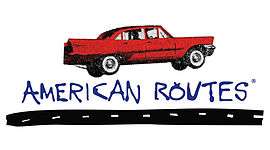American Routes
 | |
| Running time | 2 hours |
|---|---|
| Country | United States |
| Language(s) | English |
| Home station | WWNO |
| Syndicates | PRX |
| Hosted by | Nick Spitzer |
| Executive producer(s) | Mary Beth Kirchner |
| Recording studio | New Orleans, LA |
| Air dates | since 1998 |
| Audio format | Stereophonic |
| Website | http://americanroutes.wwno.org/ |
American Routes is a weekly two-hour public radio program that presents the breadth and depth of the American musical and cultural landscape. Hosted by Nick Spitzer, American Routes is syndicated by 225 stations, with over half a million listeners.[1] It is produced out of New Orleans and distributed by PRX. American Routes is the most widely heard regular presence for tradition-derived and community-based music on public radio today.
History
The show was launched in November 1997 on WWOZ in New Orleans. It was created by Nick Spitzer and Mary Beth Kirchner, who had worked together previously producing segments for All Things Considered. By 1998, American Routes was syndicated by American Public Radio for 39 stations.[2]
In the wake of Hurricane Katrina, production of the show temporarily relocated to KRVS 88.7 FM at the University of Louisiana at Lafayette in Lafayette, Louisiana.[3] While in Lafayette, Spitzer and his crew produced a series of shows called "After the Storm,"[4] which "followed the rebuilding of the Gulf Coast through the stories and songs of its musicians."[5]
Production operations have since returned to New Orleans with studios now at Tulane University. In July 2008, American Routes announced an affiliation with Tulane.[6]
American Routes celebrated its 10th anniversary on January 16, 2009, with a concert at the House of Blues in New Orleans. Performers included Dr. Michael White, Trombone Shorty and Al Johnson. Performances and interviews from the show were included in a program that aired the week of February 18, 2009.[7]
American Routes has more than 300 original shows in its catalog, and a database of over 1000 hours of interviews.[8]
As of July 6, the program will switch distributors from APM to the Public Radio Exchange, although it will continue to be distributed on the public radio satellite system. It is the second major public radio series to switch to the web-based distributor from one of the "Big 3" public radio distributors, after Sound Opinions switched from APM last year.[9]
Format
Every American Routes show is two hours long. The show consists of songs arranged around interviews, usually of musicians or field audio from various cultural events or institutions. The music is chosen to complement the theme of the show. You can find archived radio shows featuring playlists of specific artists and styles to choose from, streaming 24/7 at American Routes
The host
Nick Spitzer has hosted the public radio show American Routes since its 1997 premiere. He was Louisiana's first State Folklorist, and the founding director of the Louisiana Folklife Program. He has also been the senior folklife specialist at the Smithsonian Institution, and a commentator and producer for NPR, CBS and ABC.
Nick Spitzer is the editor and co-writer of numerous books, including Public Folklore and Blues for New Orleans: Mardi Gras and America’s Creole Soul. He was named the Louisiana Humanist of the Year in 2006 for his work towards cultural recovery after Hurricane Katrina. He is currently a professor of Anthropology and American Studies at Tulane University.[10] As preeminent folklorist and scholar of Louisiana music history , he produced and hosted a 1986 film which collected early stories and performances of roots influences on Cajun and Creole dance-hall music. The documentary is called Zydeco: Creole Music and Culture in Rural Louisiana and can be found here or on YouTube. The film documents the memories and performances of early local practitioners of roots Zydeco.
Interviews
Notable interviews featured on American Routes include:[11]
Staff
As of April 2012:[12]
- Nick Spitzer – Host and Producer
- Mary Beth Kirchner – Founding Executive Producer
- Kaori Maeyama – Managing Producer
- Maureen Loughran – Senior Producer
- Bill Deputy – Producer
- Leidy Cook – Program Assistant
- Garrett Pittman – Program Assistant
CD releases
- American Routes with Nick Spitzer: Songs and Stories from the Road [2 CD] (2008, Highbridge Company)
- Our New Orleans: A Benefit Album [CD] (2005, Nonesuch Records)
External links
References
- ↑ John Wirt (January 16, 2009). "Staying on Course" Baton Rouge Advocate.
- ↑ Samuel G. Freedman (August 13, 2000). "Crisscrossing the Wide Map of American Music" The New York Times.
- ↑ Samuel G. Freedman (September 7, 2005). "This Song Goes Out to You, Big Easy" The New York Times.
- ↑ Samuel Hughes (March/April 2009). "Digging Routes" The Pennsylvania Gazette.
- ↑ After the Storm IV: Thanksgiving http://americanroutes.publicradio.org/archives/show/150/after-the-storm-iv-thanksgiving
- ↑ New Orleans CityBusiness article (July 17, 2008), http://www.neworleanscitybusiness.com/uptotheminute.cfm?recid=18622
- ↑ Samuel Hughes (March/April 2009). "Digging Routes" The Pennsylvania Gazette.
- ↑ John Wirt (January 16, 2009). "Staying on Course" Baton Rouge Advocate.
- ↑ PRX page for American Routes.
- ↑ American Routes Staff Profile, http://americanroutes.publicradio.org/staff/205/nick-spitzer
- ↑ American Routes Show Archive http://americanroutes.publicradio.org/archive/
- ↑ Tulane University-American Routes-About Us http://tulane.edu/americanroutes/pow/about-us.cfm